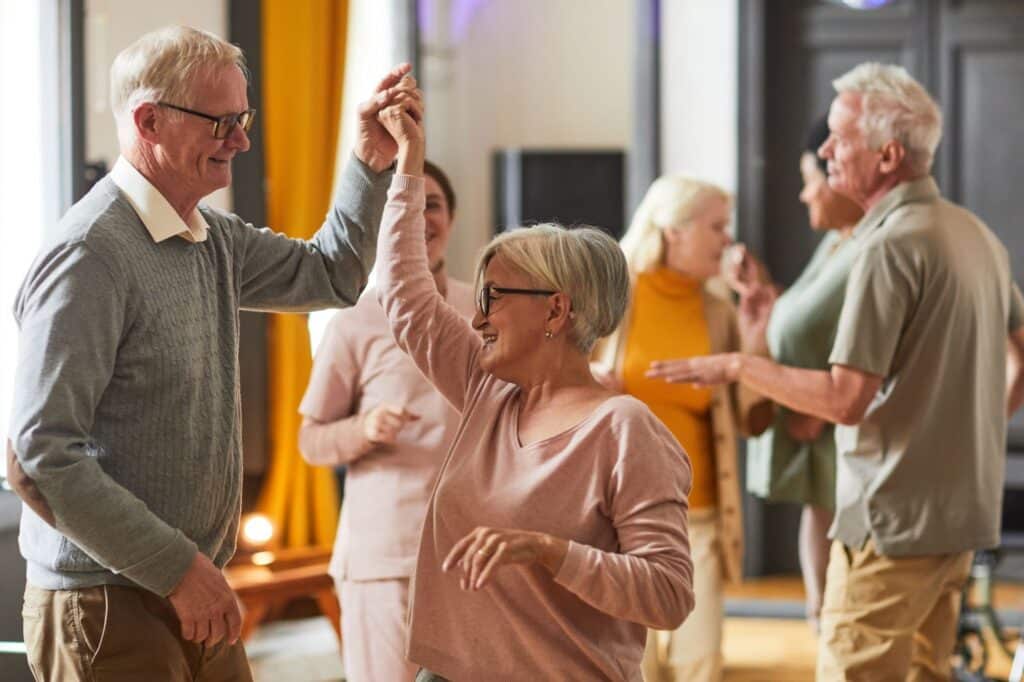Seniors who live alone often feel isolated and lonely, which can lead to depression and/or declining mental health. According to the National Institute on Aging, nearly 28% of older adults in the United States live alone, and research shows that social isolation significantly increases the risk of premature death. Loneliness has also been associated with higher rates of anxiety, depression, and even cognitive decline.
Socialization can combat these negative feelings by providing companionship, emotional support, and a sense of belonging. Engaging with friends, family, or community groups can significantly improve emotional well-being, leading to a higher quality of life and better overall health outcomes for seniors.
Here are some of the mental health benefits of socialization for seniors:
- Reduced feelings of isolation and loneliness
- Boosted mood and emotional well-being
- Improved cognitive function
- Increased sense of purpose
- Increased self-esteem and confidence
- More frequent physical activity
Reduced Feelings of Isolation & Loneliness
One of the most significant benefits of socialization for seniors is combatting feelings of isolation and loneliness. As we age, our social networks may become smaller due to factors such as retirement, relocation, or loss of loved ones. This can lead to a sense of isolation that impacts seniors’ mental health.
Regular interactions with others can help seniors feel connected to their community and provide them with a sense of belonging. Socialization also offers opportunities to form new friendships and strengthen existing ones, reducing feelings of loneliness and improving overall well-being.
Boosted Mood & Emotional Well-Being
Socialization can have a significant impact on seniors’ mood and emotional well-being. Engaging in social activities, whether it be going for a walk with a friend or participating in a group hobby, can release feel-good hormones like oxytocin and dopamine.
These hormones help reduce stress, anxiety, and depression while boosting feelings of happiness and contentment. Regular social interactions can also provide an outlet for seniors to express their emotions and receive support from others, leading to improved mental health outcomes.
Improved Cognitive Function
Socialization can also have a positive impact on seniors’ cognitive function. Engaging in conversations and participating in group activities can stimulate the brain, keeping it active and healthy. Conversations also provide opportunities for learning new things and challenging oneself with new perspectives, which is essential for maintaining one’s cognitive abilities.
According to research, socializing with others can even help delay or prevent age-related cognitive decline and conditions such as dementia and Alzheimer’s disease.
Increased Sense of Purpose

As we age, our roles in life may change, leading to feelings of loss of purpose or identity. Socialization can provide seniors with a sense of purpose by giving them the opportunity to contribute and make a difference in others’ lives.
For example, volunteering or participating in community service projects can give seniors a sense of fulfillment and purpose. It can also help them feel connected to their communities and give them a sense of making a positive impact on society.
Increased Self-Esteem & Confidence
Socialization can also boost self-esteem and confidence in seniors. Interacting with others and receiving positive feedback, compliments, and encouragement can help seniors feel valued and appreciated.
Participating in social activities also allows seniors to develop new skills, try new things, and conquer new challenges. These accomplishments can increase self-confidence and provide a sense of achievement.
More Frequent Physical Activity
Participating in social activities often involves physical movement, which is crucial for maintaining good physical health. Whether it be dancing, playing sports, or simply taking a walk together, socializing with others can encourage seniors to stay physically active.
Regular physical activity can help seniors maintain a healthy weight, improve balance, flexibility, and strength, as well as prevent chronic diseases such as heart disease, diabetes, and osteoporosis.
Social Activities for Seniors
There are many social activities that seniors can participate in to reap the benefits of socialization. Some popular options include:
- Joining social or hobby clubs, such as book clubs, gardening clubs, or music groups
- Attending senior centers or community events
- Taking classes or workshops on a topic of interest
- Traveling with friends or joining travel groups specifically for seniors
- Participating in group exercise programs like yoga or tai chi
Seniors can also use technology to connect with others and engage in virtual activities. Many organizations offer online classes and events designed for seniors, allowing them to socialize from the comfort of their own homes.
Fostering Connections & Socialization for Seniors at The Legacy at South Plains
Socialization plays a crucial role in maintaining good mental and physical health in seniors, and can also bring them a sense of purpose and fulfillment. By encouraging seniors to participate in social activities, we can help them lead happier and healthier lives.
At The Legacy at South Plains, we understand the importance of socialization for seniors and offer a variety of opportunities for our residents to connect with others and stay active. From organized events and outings to daily activities, we strive to create a vibrant and engaging community where seniors can thrive.
We believe that fostering social connections can help our residents live their best lives. Reach out to us today to learn more about our assisted living and memory care services.
